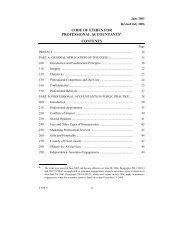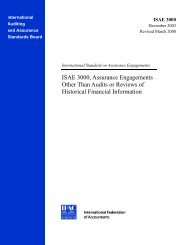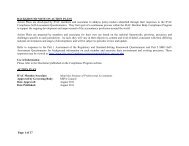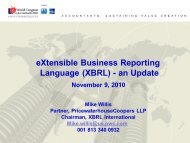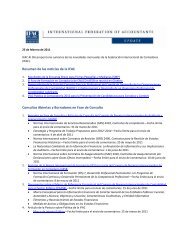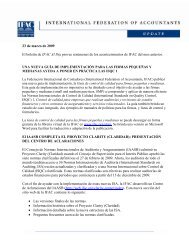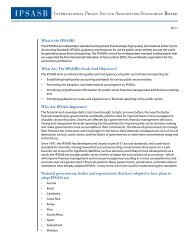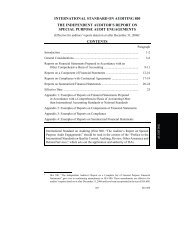ipsas 29—financial instruments: recognition and measurement - IFAC
ipsas 29—financial instruments: recognition and measurement - IFAC
ipsas 29—financial instruments: recognition and measurement - IFAC
Create successful ePaper yourself
Turn your PDF publications into a flip-book with our unique Google optimized e-Paper software.
FINANCIAL INSTRUMENTS: RECOGNITION AND MEASUREMENT<br />
For example, a market for private issue financial <strong>instruments</strong> can be a marketplace.<br />
B.28 Regular Way Contracts: Forward Contract<br />
Entity ABC enters into a forward contract to purchase one million of M’s ordinary<br />
shares in two months for CU10 per share. The contract is not an exchange-traded<br />
contract. The contract requires ABC to take physical delivery of the shares <strong>and</strong> pay<br />
the counterparty CU10 million in cash. M’s shares trade in an active public market<br />
at an average of 100,000 shares a day. Regular way delivery is three days. Is the<br />
forward contract regarded as a regular way contract?<br />
No. The contract must be accounted for as a derivative because it is not settled in the<br />
way established by regulation or convention in the marketplace concerned.<br />
B.29 Regular Way Contracts: Which Customary Settlement Provisions Apply?<br />
If an entity’s financial <strong>instruments</strong> trade in more than one active market, <strong>and</strong> the<br />
settlement provisions differ in the various active markets, which provisions apply in<br />
assessing whether a contract to purchase those financial <strong>instruments</strong> is a regular<br />
way contract?<br />
The provisions that apply are those in the market in which the purchase actually takes<br />
place.<br />
To illustrate: Entity XYZ purchases one million shares of Entity ABC on a US stock<br />
exchange, for example, through a broker. The settlement date of the contract is six<br />
business days later. Trades for equity shares on US exchanges customarily settle in three<br />
business days. Because the trade settles in six business days, it does not meet the<br />
exemption as a regular way trade.<br />
However, if XYZ did the same transaction on a foreign exchange that has a customary<br />
settlement period of six business days, the contract would meet the exemption for a<br />
regular way trade.<br />
B.30 Regular Way Contracts: Share Purchase by Call Option<br />
Entity A purchases a call option in a public market permitting it to purchase 100<br />
shares of Entity XYZ at any time over the next three months at a price of CU100<br />
per share. If Entity A exercises its option, it has 14 days to settle the transaction<br />
according to regulation or convention in the options market. XYZ shares are traded<br />
in an active public market that requires three-day settlement. Is the purchase of<br />
shares by exercising the option a regular way purchase of shares?<br />
Yes. The settlement of an option is governed by regulation or convention in the<br />
marketplace for options <strong>and</strong>, therefore, upon exercise of the option it is no longer<br />
accounted for as a derivative because settlement by delivery of the shares within 14 days<br />
is a regular way transaction.<br />
IPSAS 29 IMPLEMENTATION GUIDANCE 1172


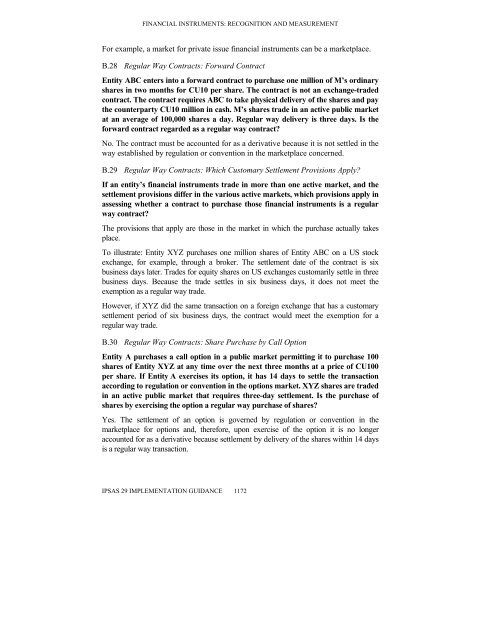
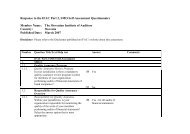
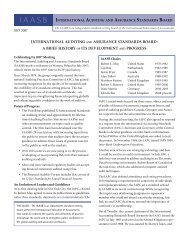
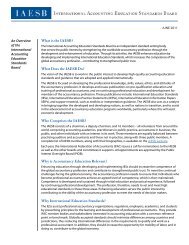
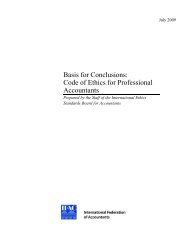
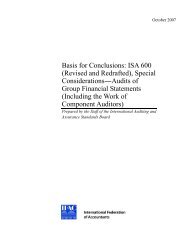
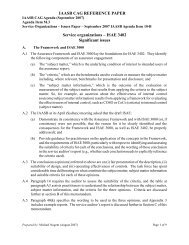
![International Auditing and Assurance Standards Board [IAASB] - IFAC](https://img.yumpu.com/22522144/1/190x245/international-auditing-and-assurance-standards-board-iaasb-ifac.jpg?quality=85)
